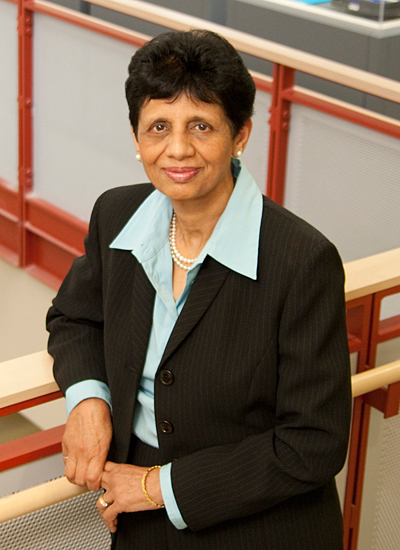Through an esteemed career in both academia and industry, Dr. Veena Rawat, PhD’73, has become a mentor and inspiration to young women in STEM on an international level.
Rawat was the first woman to ever obtain a PhD in electrical engineering from Queen’s for her research in increasing the accessibility of telecommunications in difficult areas (i.e. mines). At the time, being a woman in this field of education came with gender-based restrictions. Rawat credits her supervisor at the time, Dr. John Beal, with providing her equal opportunity and never allowing these restrictions to stand in the way of her work. “At the time, the mines did not allow women to go inside, and I needed some data to be collected from the mine,” said Rawat. “He was always working around any challenges like that. I explained what I was looking for and he just sent a technician. I got the data.” Despite the adversity, Rawat recalls her time at Queen’s as a truly positive experience.

After graduation from Queens, she worked at Computing Devices Canada where she was able to apply her PhD thesis work in the development of real life applications. In late 1974 she began working within the Canadian Government dealing with telecommunications where she developed a keen interest in policy, engineering and regulations in the communications technology sector. “I really developed my career there because the government gave me lots of opportunities for moving around from engineering to policy regulations, to international work,” recalled Rawat, who went on to hold several leadership roles within government.
Firsts were numerous for Rawat, as she subsequently went on to be the first female president of the Communications Research Center of Industry Canada, and the first woman to chair the ITU’s (UN’s telecommunications organization) World Radio Conference-2003. She earned numerous honours and awards for her work including the 2011 Public Service Award of Excellence from Government of Canada, and in 2014 was awarded the Officer of the Order of Canada for her lifetime achievements and contributions on national and international levels to wireless communications.
Rawat is now passionate about motivating the next generation of women to follow in her footsteps. Primarily she works with women who have already entered the workforce in STEM fields, who are looking to advance their careers and take on leadership roles. “It takes a lot of confidence to do those things. For me, working with the right people really built that confidence,” Rawat says of her own experience. “They never led me to believe that I couldn’t do it.” She believes that, through sharing her advice, she can motivate women to gain that same confidence and believe that they too can have a career, personal life, and family life.
Her advice for young women follows those same beliefs. “It just takes a lot of hard work, a positive attitude, and definitely confidence in yourself. There will be challenges, but for every problem there is a solution.”
In 2019, she received honorary doctorate from the University of Ottawa’s Faculty of Engineering.
Today Dr. Rawat is a consultant, advising national and international entities on telecommunication policies and regulations and continues to get involved with organizations promoting women to pursue leadership position in telecommunications.